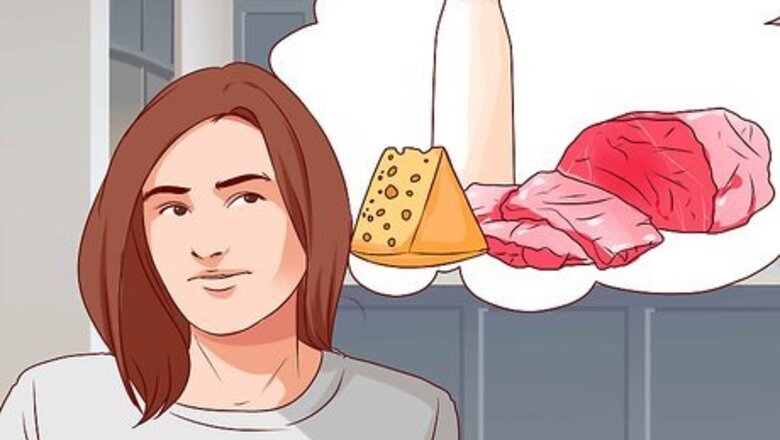
views
Reintroducing Yourself to Animal-Based Foods
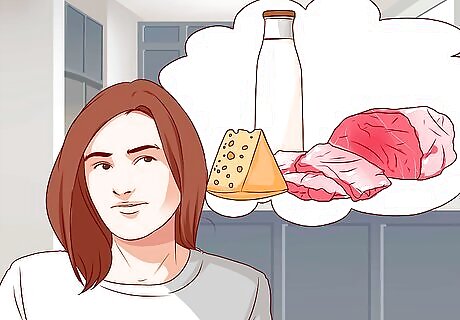
Start slowly. If you haven't eaten any animal products for your entire life (or even for several years) suddenly consuming meat and dairy products can make you sick. Any time you introduce a dramatic change into your gut flora, your body will take time to adjust. You could experience bloating and discomfort for a few days after ending your vegan diet. If veganism was a big part of your life, giving it up can be hard. Make the change easy on yourself by adjusting slowly into a standard diet. Introduce one food at a time per week as you reintroduce animal-based products. That way if you have intolerances or issues that persist, you will be able to pinpoint the food you added in that caused the symptoms.
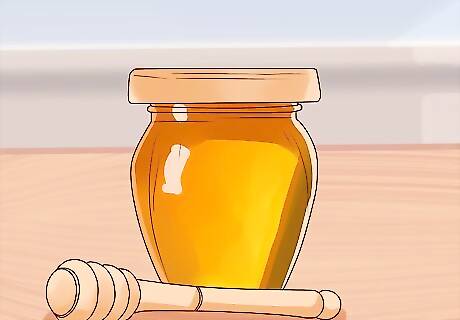
Eat some honey. Honey is gentle on the digestive system and can easily be incorporated into oatmeal, tea, or baked goods. Bringing honey back into your diet will officially take you off the vegan wagon, but you're unlikely to notice any difference in your health or condition since it has few to no negative health effects associated with it.
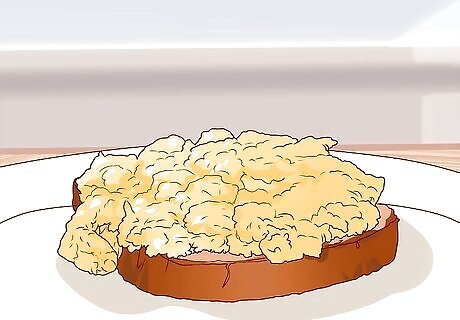
Try some vegetarian foods that have animal milk or eggs. Scrambled eggs on toast is a delicious snack, night or day. Cereal or oatmeal can be prepared easily when you're on the go, or headed out the door in the morning. Muffins, cakes, and pies often utilize milk and/or eggs in a form which is gentle on the digestive tract. Try baking some of your favorite baked goods with cow's milk.
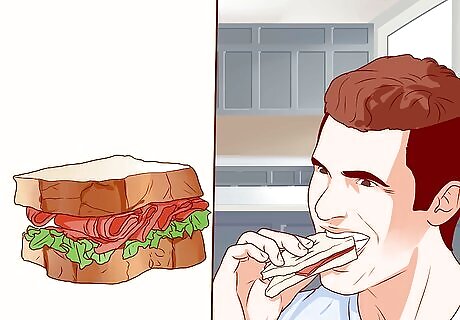
Slowly reintroduce meat to your diet. Anecdotal evidence suggests that trying a small portion of meat as a topping on salad, or a few slices of ham in a sandwich, is the best way to reintroduce yourself to meat. If you wish, after a week or so, you can transition to more substantial portions of meat like chicken breast and hamburgers. If you feel sick, remember not to push yourself. Your body's digestive powers vary with the type and quantity of food consumed.
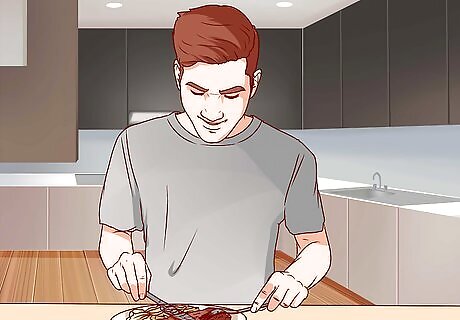
Accept your new diet and lifestyle. Transitioning away from a diet you may have believed was the one true path can be hard. You might be made to feel guilty, or experience shame due to the perception you've “lapsed” or let yourself down. While it's understandable to be sad about letting part of your identity go, think of it instead as a new beginning. Remember, the right choices for your health now aren't necessarily the same as the choices you made when you became vegan. Find the balance that's right for your health and lifestyle. Don't feel like you're alone when you revert to eating meat. A recent study found that fully 84% of vegetarians, including vegans, end up eating meat again at some point.
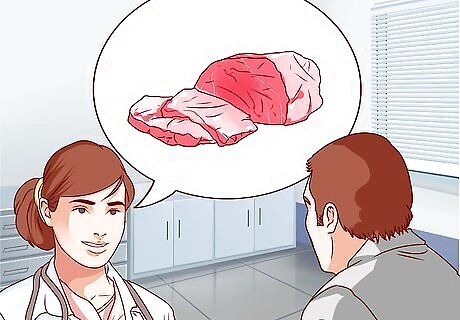
Consult a doctor if you have concerns about your overall health. Doctors can draw blood, measure cholesterol, and run other tests that provide more information than you can access on your own. If your medical benchmark scores have improved or worsened, your doctor will let you know, and you'll then be better-informed about what diet is right for you.
Considering Alternative Diets
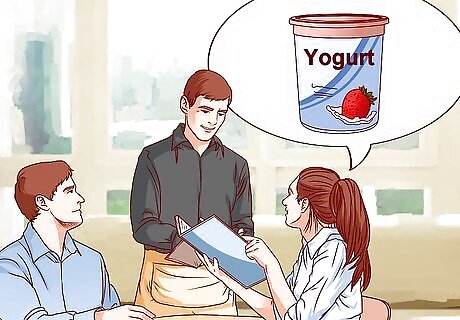
Consider alternatives to quitting veganism. Before you decide to quit veganism, make sure you're truly ready. Maybe consuming a few dairy products or egg products while you're at friends' houses or restaurants would work for you. Maybe eating only baked goods once a day is a compromise you can live with. If only dessert time is a challenge, carry some vegan chocolate bars with you so you always have a vegan option when you want something sweet. So-called “flexitarian” diets allow you to maintain a primarily vegan or vegetarian lifestyle with a few “cheater” meals or snacks thrown in to keep you sane.
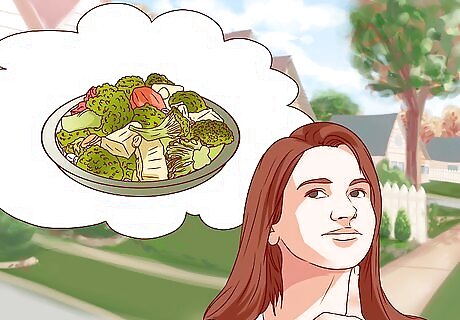
Consider going vegetarian. If you have been vegan for a long time, it may be hard to eat meat in addition to milk, eggs, and other animal-based products. Vegetarians, unlike vegans, are permitted all these things. Perhaps you began, as many vegans do, as a vegetarian. With this diet, you'd still be meat-free and avoid the associated health risks with meat consumption. Try moving back to vegetarianism to see if it's right for you. Vegetarians are more successful at meeting their daily protein requirements as they have more protein-rich options.
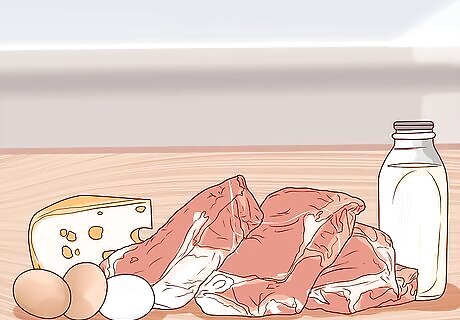
Consider getting free-range meat. Free-range meat is produced outside the traditional factory farm system and allows animals to have freedom of movement, social interaction with others of their kind, and sometimes even enjoy fresh air outside. If you initially became vegan because you were disgusted by the factory farm system, you might try getting free-range meat and dairy products. Urban farms are good places to find free-range eggs, meat, and dairy. Check local farmers markets or contact your local farms directly. Certified Humane maintains an authoritative list of humanely produced meat here: http://certifiedhumane.org/whos-certified/.
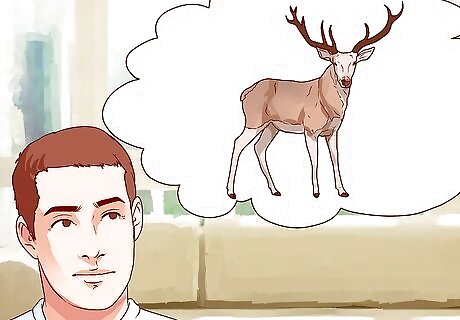
Consider eating wild animals. If you kill and eat animals you've personally hunted, you'll at least know that they lived a free life in the wild before they died. These are animals which might easily have been victim of bears or other wild animals. Hunting and eating them isn't malicious; rather, it fulfills the natural circle of life. Like free-range meat, eating animals which have been hunted in the wild may relieve some of the ethical pressure associated with giving up veganism.
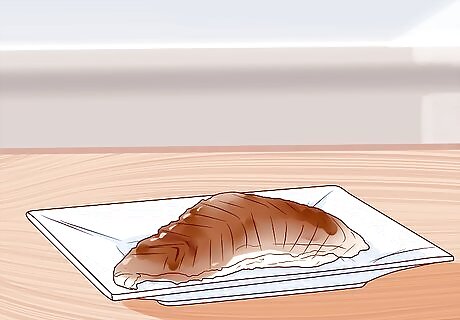
Consider eating a pescetarian diet. Pescetarianism, in its classical form, is a dietary regimen in which you eat no eggs, no dairy, no animal products of any kind, except fish. Varieties of the pescetarian diet permit combinations of fish and eggs or fish and dairy. The diet is a variety of vegetarianism/veganism and shares many of its health benefits.
Considering Personal Reasons to Leave Veganism
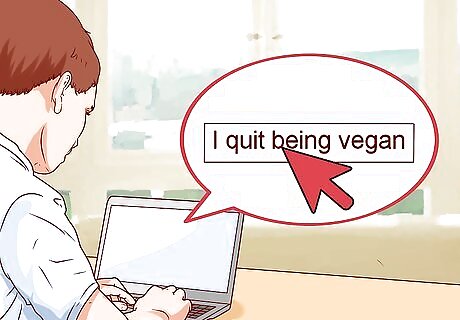
Read some accounts of what it's like to quit veganism. If you decide veganism isn't for you, you're not alone. There are plenty of others out there just like you who, for whatever reason, decided the vegan way was not for them. Using your favorite internet search engine, search for a phrase like “leaving veganism” or “I quit being vegan.” Reading accounts and thinking about the experiences of others who have felt like veganism was too much for them might help you reach a positive decision for yourself. If you find you empathize with their perspectives, perhaps you're ready to quit being vegan, too.
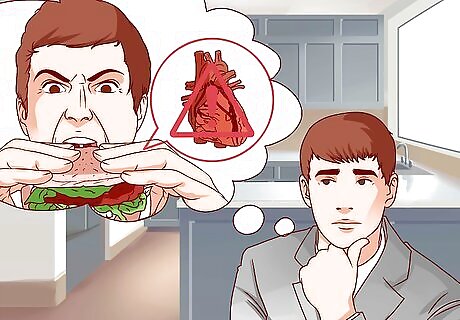
Recognize when your perspective has changed. Ask yourself why you began eating a vegan diet in the first place and if you still hold the same beliefs. Have your beliefs changed around factory farming or the consumption of meat and animal products? If so, veganism may no longer resonate with your values, and you might wish to resume eating the standard omnivorous diet. Perhaps you became a vegan because you are against factory farming. You may choose to eat only animal products that are confirmed free-range and humanely slaughtered. In this case, you may be able to marry your beliefs about the humane treatment of animals with eating meat.
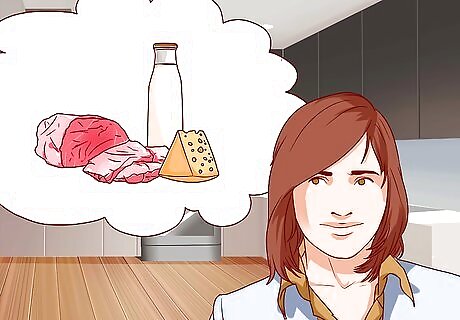
Recognize when you aren't eating the food you want. The lack of satisfaction might take many forms. Perhaps you salivate at the sight or smell of bacon. Perhaps you have cravings for meat or even vegetarian foods. Or maybe you feel bad when you're out with friends and the only thing on the menu that's vegan is fries and a salad. If you were raised vegan and have never tried meat, dairy, fish, or eggs, you might wonder what you're missing. Try branching out with some non-vegan foods to see if an omnivorous diet might be for you. Just because you aren't happy with the food you're eating doesn't necessarily require that you give up veganism. Maybe you just haven't found the kind of vegan foods you like yet. Suggest a vegan restaurant to your friends next time you go out. Don't feel ashamed or bad for making your friends accommodate you — they're your friends and will be happy to do so! Plus, they'll get the opportunity to branch out and try something new. If you feel veganism isn't right for you because you do not have acceptable alternatives, look around a bit more. Vegan versions of almost every food imaginable are available somewhere. Try shopping at a different grocery store than the one you usually patronize. Small grocers and health food stores are worth checking out.
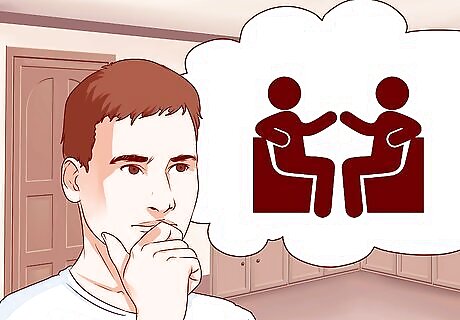
Consider your culture. Perhaps you come from a culture or society which values killing and eating animals. These animals might be located and killed by you directly in hunting, or simply purchased from the local butcher by way of factory farms. If you feel you are unable to fully share in certain family rituals (a big annual barbecue cookout, for instance), you may be considering giving up veganism. Before giving up veganism, think about ways that you might adapt to, and still partake in, rituals with your friends or family. Suggest that instead of hunting and killing the animals in the forest, you venture into the forest to enjoy the solitude of nature and grace of the animals you track together. You'd then get to share quality time and conversation with your father, mother, brothers, or whomever, while staying vegan. Don't let others pressure you to give up veganism (or become vegan) if you aren't ready or don't want to. Doing something you don't really want to do in order to please others is a recipe for frustration and unhappiness.

Consider your work life. Is there some professional reason you might be obligated or strongly encouraged to eat animal products? Food journalists, for instance, will need to try a variety of dishes when reviewing restaurants or food products, including foods which they themselves won't eat. (Rarely is a restaurant's signature dish vegan.) Workers in the food service industry — cooks, bakers, and waiters — may be expected to sample non-vegan foods so as to better prepare or describe them. Consider putting a vegan spin on your profession. If you are a food journalist, maybe you can start specializing in vegan cuisine and restaurants. If you are in the restaurant industry, you may be able to find a vegan restaurant where you can work.
Considering Health Reasons for Leaving Veganism
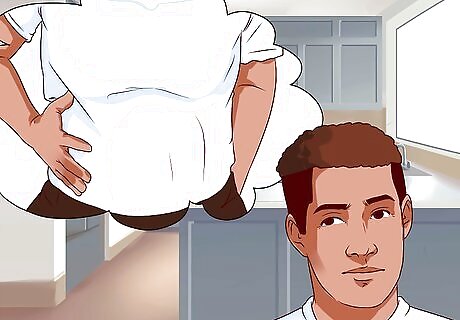
Notice if you experience bloating. When you adopt a vegan diet, you'll probably start eating a lot more beans and legumes, which are a good source of protein. These are made of sugars, carbs, and fiber. Sensitivity to these foods or their constituent ingredients may cause bloating. If you continue to feel bloated for weeks on end, you might consider leaving veganism. You might initially feel bloated when eating these foods, but gradually adjust to them as you progress in your vegan diet. Don't give up quickly if you experience bloating. Another alternative to quitting veganism is to just reduce the amount of legumes and beans in your diet. There are many other avenues to getting an adequate amount of protein without lots of legumes and beans.

Recognize feeling constantly sluggish. Iron in the blood provides a substantial amount of energy to the body. Vegan diets may lack adequate iron content and often don't get enough protein. You can easily correct iron deficiencies by taking a multivitamin or iron supplement. You can boost your iron absorption by eating iron-rich foods in combination with foods in which vitamin C is present.

Identify if you're developing an unhealthy relationship to food. Did you transition to a vegan diet because you wanted an easy way to restrict your calorie intake and lose weight? While this in itself is not unhealthy, if taken too far, it might indicate you might suffer from anorexia. Anorexia is an illness in which you avoid eating to attain a thin body. Signs you might be obsessed with your food intake include: Feeling guilty for everything you eat Over-thinking every time you eat Trying to always eat the “perfect” nutritional profile or calorie count.
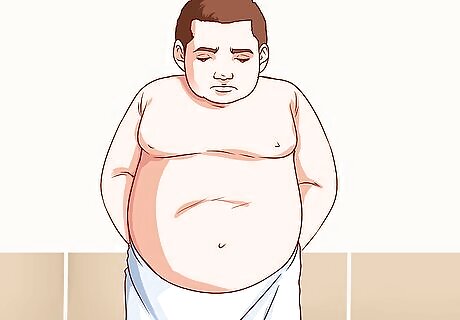
Identify if you're gaining weight. While vegans have far lower rates of obesity than omnivores, a vegan diet does not guarantee you'll arrive at a healthy weight. Perhaps you've replaced your standard diet with one organized around candy, chips, and soda. If so, you might gain weight and consider moving away from veganism. Alternately, you might try introducing more vegetables, fruits, and beans into your diet. Vegan versions of foods you may have eaten as an omnivore (burgers, deli meat, cheese) are easy to find in most local grocery stores as well. A balanced diet is important no matter whether you're vegan or not.















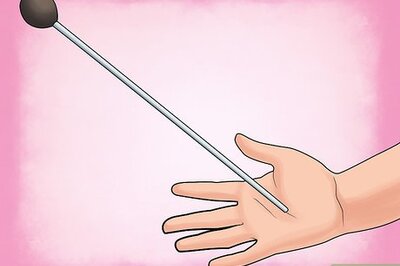


Comments
0 comment